A proactive approach to delivering a positive customer experience has never been more important in driving forecourt loyalty. That’s the opinion of Karl Jacoby, CEO of tech firm, Techniche. He says: "Forecourt maintenance has a crucial role to play in achieving high standards of customer satisfaction, ensuring facilities and assets are available and functioning around the clock."
Steve Watts, director at TSG, agrees: "By having a fully operational site with all of your products and services working at their best, you’re giving the best quality service to your customers. Ensuring they stay loyal to you and your brand."
Tim Lamb, account manager at TSG, adds: "Waiting for a problem to arise can cause all manner of issues for your site. In the worst case, leaving you closed for business and losing money and customers. But it needn’t be the case. All of our contracted sites benefit from our regular maintenance support. As part of our service to all of our customers, we dial into contracted sites to help maintain their database, reducing the number of breakdown calls.
"Should a problem arise, our experienced analysts are on hand to deal with it backed up by nationwide service engineers, on call to deal with faulty hardware issues from the simplest of cash drawer problems to the replacement of a hard drive as well as answering questions, quickly and concisely. By using the latest cloud-based technology we will also ensure the critical data you require is available, should it be required."
Jacoby says that predictive maintenance fixing assets before they break is the ’holy grail’ for retailers, however the industry is still some way off achieving this. "Planned maintenance is a more effective approach than reactive maintenance, however this requires a comprehensive asset register to be in place. In our experience, this is still the preserve of the larger networks, as proactive inspections demand a certain level of investment.
"However, maintenance management software will help forecourt operators of all sizes to automate processes and manage their assets. Using a software system to structure asset data effectively is within the reach of all operators. Once a data structure is established, it allows meaningful analysis of asset performance, cost and maintenance regimes, together with the application of business intelligence."
Techniche’s Urgent facilities management platform streamlines processes, manages assets and provides full visibility of all maintenance operations. It is currently used in 34 countries, by companies including BP, Q8 and AECOM.
Techniche recently announced that Harvest Energy will soon be using Urgent to support its UK maintenance operation across almost 90 company-owned service stations.
Harvest Energy wanted to increase the visibility and control of all maintenance activity within its network, to improve operational efficiency and reduce costs. The Urgent platform aims to automate repair workflows, offer real-time reporting and enable Harvest Energy to respond to all maintenance requests as quickly as possible. The new system is expected to go live by the end of 2019.
"Urgent’s FM software is the acknowledged go-to product for the major petrol retail sector, including BP and Shell, so we know we are in good company by choosing this solution," explains Ian Woodcock, retail director, Harvest Energy.
Another satisfied customer is Rontec. "We use Urgent to streamline and automate maintenance across our entire network of over 260 forecourts," says Parsya Amin, Rontec’s engineering contracts manager. "A key component of our company strategy is to shape the business around our customers’ needs, therefore any maintenance issue on the forecourt needs to be resolved quickly to maintain high levels of customer satisfaction. Our maintenance management system enables us to do just that."
less time on site
Stuart Tomkinson, operations manager of Europump Maintenance, says that one of the big changes in the pump maintenance industry has been a move away from preventative maintenance to reactive maintenance.
"Engineers are given less time on site with their focus on fixing within SLAs (service level agreements) rather than spending time carrying out additional checks on other pumps while they’re there. This move away from preventative pump maintenance doesn’t make any sense because fuel is dirtier due to biofuels; pumps are doing greater volumes as the number of sites continues to reduce; pumps are more electronically advanced with the addition of Stage 2 and automatic temperature compensation (ATC); and the cost of reactive maintenance is constantly going up with fuel and labour costs increasing.
"The squeeze on fuel margins has probably caused the focus on reducing maintenance spend on pumps, but this reduction in pump maintenance costs has not come without a price," adds Tomkinson.
"Nozzle availability, speed and customer experience are more important than people might think, especially when retailers focus more on the higher-margin shop and food-to-go offer. Replacing parts such as belts, filters, seals and lights after preventative maintenance checks comes at a lower cost than if problems are left unnoticed and components are allowed to fail in normal operation."
He says true preventative maintenance should involve a number of checks such as changing/cleaning filters before they are fully blocked, changing belts before they fail, checking the safe operation of nozzle cut offs, checking for hose wear, making a visual inspection for leaks, checking pulley bearings for excessive movement and cutting back meters that are over dispensing but still within legal tolerance, which is plus-100ml or minus-50ml from ’strike’.
Steve Watts at TSG says that retailers do expect their fuel to be in top-notch condition when it’s delivered. However, he adds: "Microbial contamination of diesel fuels isn’t something we can escape and can occur at any point in the supply chain where water is present. Leaving your tanks unchecked can result in all manner of problems. From reduced fuel quality and reports of lower MPG from customers, through to problems with blocked filters and nozzles and, at its worse, erosion of your fuel tanks leaving you with a hefty bill to replace the affected tank and fuel, at best, and a site closure and loss of customers, at worse. By undertaking preventative maintenance, forecourt owners can significantly reduce the risk of major issues occurring with their tanks."
Depending on the age of your tanks, TSG can create a tailored preventative maintenance contract. These can offer a monthly, quarterly, yearly or customised check-up suitable for your site and budget, allowing the TSG team to carry out quality testing and conformity on site, with minimal disruption.
"Should a problem arise, our team of experts can provide the services to remove contamination, before it becomes a costly problem. Should there be a requirement to repair a leaking tank then our tank lining ’bladder’ solution will bring the tank back into service quickly and with the added benefit of a double-skin leak monitoring system for 24/7 piece of mind."
Image is everything nowadays so forecourt maintenance needs to extend across the whole site. Sean Kearney, business development director at ID Maintenance, believes that at times, familiarity can cause blindness to the deterioration of a site and the key elements that create an inviting bright clean environment for customers.
"In the past most oil companies implemented a planned preventative programme to clean, refresh and ensure proper annual maintenance of the image, branded signage, lighting and painted surfaces of the forecourt, practically on company-owned sites. Now it’s only the forward looking companies that implement such regimes to maintain their assets."
ID Maintenance recommends a full lifecycle maintenance agreement to ensure the highest standards are maintained.
Kearney lists the things to check on a forecourt:
Is the canopy signage clean, free from impact damage and all illumination functional?
Are all the under-canopy lights clean and functional?
Is the canopy soffit sheeting clean?
Is the pump and fuelling area clean, are all pump vinyls in good order, are the pumps displaying E5 and B7 fuel grades on the nozzle and pump (new legislation as of September)?
Is the canopy gutter clean of any debris that could cause blockages?
Are the canopy stanchions clean and paint in good order?
Is the price sign fully illuminated and clean?
Is all facility signage cleaned regularly and in good order?
Are any grassy areas and vegetation around the site regularly maintained?
Getting ready for E10
While there is still a question mark over the introduction of E10 in the UK, Eurotank Service Group advises forecourt operators to be ready for when it arrives by carrying out an audit of their fuel system infrastructure. Group managing director, Edward Wheeler, says: "If E10 does get introduced it is likely that retail petrol fuel systems will suffer from contamination and product escapes due to gasket and seal material incompatibility. Retailers need to review their sites to find out how old the tank gaskets, seals and joints are, and invest in a replacement programme to bring them up to date with higher ethanol blends using materials suitable for up to E85. Using E85-resistant materials is necessary because, in certain circumstances, there could be a higher percentage of ethanol than the stated content. For example, ethanol vapour escaping could saturate any water in a tank top, and tank water bottoms could also contain concentrated ethanol."
Wheeler adds that when tank gaskets, seals and joints are replaced, retailers should also take the opportunity to have pipelines and tanks cleaned in preparation for higher ethanol blends, which can mobilise any sludge and rust inside a tank if not removed, causing fuel contamination.
At this stage, Eurotank can also carry out tank re-tightening to extend the life of tanks through destructive testing and repair methods. "Steel tanks generally fail due to spot corrosion but using our re-tightening process, failed single-skin underground storage tanks can nearly always be repaired without the need to complete a full re-line.
Cleaning up fuel spills on the forecourt
When forecourt fuel spills occur, a quick clean-up is important from both a health and safety and housekeeping perspective. Up to now it has been standard practice for any fuel spill to be treated with sand and then transferred to a bucket for safe disposal. Not only does this cause the lane to be out of action but also customers may be transferring contaminated sand into your store and into their cars. With Active Fuel Spill Digester, available from Tate Business Group, sand becomes obsolete. It is described as a ’revolutionary’ way to deal with fuel spills both from a safety and an environmental point of view. In each bottle of concentrated solution, there are millions of naturally occurring hydrocarbon-eating bacteria together with specially engineered enzymes that assist in eating the fuel.
Amanda Heenan at Shell Discovery, Dundee says: "I have been using the fuel digester for a month and I find it works really well. I’ve now ordered my second bottle as it seems to also clean away old spillage stains which are left behind from covering with sand."
Retailer view
"Having an MFG site, I use their nominated contractors and being a franchisee, I am sure the cost is included within my licence fee.
"I stay on top of forecourt maintenance with daily checks that I complete and, should I find anything wrong, I log a job.
"I am a firm believer that should a pump go down due to a communication problem with the till or a slipping belt, this needs to be rectified straight away as I do think downtime has a negative impact on the business.
"Pumps being out of order is not good for the customer and if they see out-of-order signs they are likely to go elsewhere.
"There are regular services done on the pumps which I would say are done six-monthly.
"As for daily checks, these vary from a visual check to actually taking the fronts off the pumps to make sure they are not leaking etc.
"Barton Mills is an extremely busy site and having been re-built we have not had any issues yet, but we are only 18 months old."
Caring for your canopy
Canopy maintenance is often carried out only when something goes wrong, for example when water dripping through the canopy is the first visible sign that there is a problem.
"It is unusual these days for forecourt operators to carry out a planned maintenance regime but water leaking from a canopy should not be ignored because over time serious defects can arise," says Martin Steggles, managing director of Global MSI.
"Sheeting to the underside and fascia branding around the perimeter can often conceal badly rusting components that over time could lead to a partial or even complete collapse. Electrical components inside canopies can also become wet, which is a serious hazard."
Steggles says canopies were installed with a minimum design life of 25 years but require regular maintenance. "Our records show that a significant number of petrol forecourts have canopies that are over 25 years old and many that are at least 40 years old. Our concern is the lack of preventative maintenance or regular inspections being carried out on these structures. Historically, the only maintenance carried out is after the event, either when the roof leaks or the canopy is impacted. Just in the last few weeks our surveyors have attended two forecourts where the canopies were in such poor condition that we advised complete replacement.
"We recommend regular planned maintenance. A survey by a trained surveyor will provide an early warning of any potential issues with the canopy. Early intervention is always cheaper."


















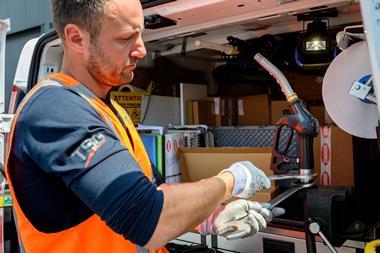

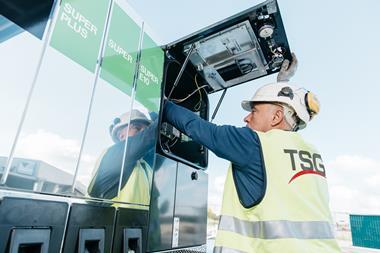
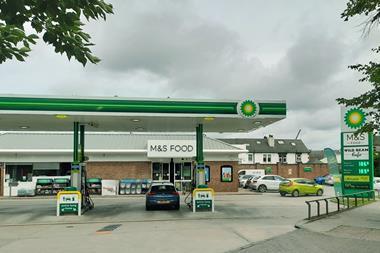
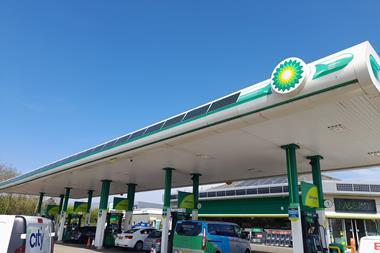


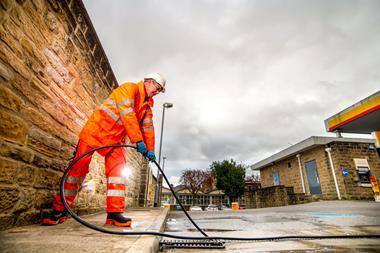

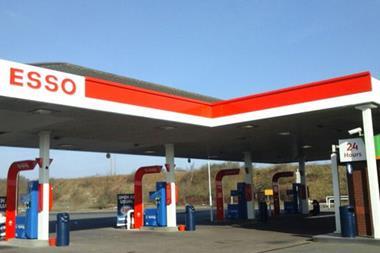
No comments yet